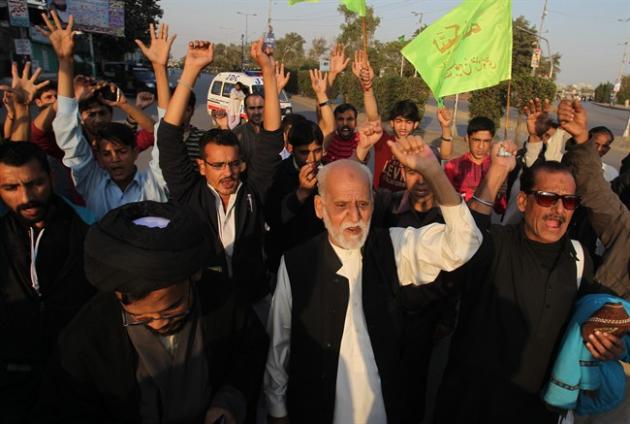اضيف الخبر في يوم السبت ٣١ - يناير - ٢٠١٥ ١٢:٠٠ صباحاً.

Bomb kills 56 at Shiite Muslim mosque in southern Pakistan as fears of militancy surge grow
ISLAMABAD - A bomb blast ripped through a Shiite mosque in southern Pakistan as worshippers gathered for Friday prayers, killing at least 56 people and wounding dozens more, in the deadliest act of anti-Shiite violence in two years.
The attack compounds Pakistan's security challenge to contain a surge in militancy following last month's killing of 150 people, mostly children, at a Peshawar school.
The militant Sunni group Jundullah claimed responsibility for Friday's bombing in the city of Shikarpur in Sindh province, 500 kilometres (310 miles) north of the port city of Karachi.
That area of Pakistan has suffered comparatively little violence in contrast to the northwestern tribal areas bordering Afghanistan and in Karachi. Friday's bloodshed raised fears that extremists could be gaining a foothold in the region.
Hadi Bakhsh Zardari, the deputy commissioner of Shikarpur district, said 56 had died and 31 were hospitalized. Dr. Shaukat Ali Memon, director of the hospital in Shikarpur, appealed on Pakistan's state television for residents to donate blood.
Pakistani television showed residents and worshippers frantically ferrying the dead and wounded to the hospital. Local media reported that parts of the roof had collapsed on the worshippers, and some people had been trapped inside.
Amid the chaos following the explosion, victims were shuttled to the hospital on motorcycles and rickshaws, according to hospital official Imtiaz Hussain.
Prime Minister Nawaz Sharif condemned the violence and called it a suicide bombing, but Zardari and other officials said they were still investigating the cause.
"Explosive experts and police are still debating whether it was a planted bomb or a suicide attack due to conflicting evidence on either side," Zardari said.
Jundallah spokesman Fahad Mahsud claimed responsibility for the attack in a telephone call to The Associated Press, but gave no details about how it was committed. The militant group previously has claimed responsibility for attacks on Shiites and other religious minorities, including a 2013 double suicide bombing of an Anglican church in Peshawar that killed 85 people.
Many Sunni extremists do not consider Shiites, who represent 10 per cent to 20 per cent of Pakistan's population, to be true Muslims. Sunni militants in Pakistan have bombed Shiite mosques, killed Shiite pilgrims travelling to neighbouring Iran and assassinated Shiite religious figures and community leaders.
Friday's death toll was the worst against Shiites since January 2013, when a bomb in the neighbouring province of Baluchistan killed 81 people in a Shiite area of Quetta. Human rights groups have faulted the government and security services for failing to protect Shiites adequately or pursuing those responsible with sufficient effort.
While Karachi has been the site of repeated bombings blamed on militant groups such as the Pakistani Taliban, much of the rest of Sindh province has been much more peaceful — but experts warn this could be changing rapidly.
An American think-tank , the United States Institute of Peace, reported earlier this week that sectarian groups targeting Shiites are building a power base in the traditionally harmonious north.
"The province is at a tipping point. Extremist groups are increasingly active in the central and northern districts, disrupting the pluralistic culture that has long defined the province," the report found.
In July 2013, suicide bombers and gunmen attacked a compound in Sukkur that houses government agencies including the regional offices of the military's powerful spy agency, the Inter-Services Intelligence, killing three people and wounding dozens more.
The attack Friday comes less than two months after the Peshawar school attack by the Pakistani Taliban shocked the country and spurred the government and military to step up their campaign against militants. The military has been hammering militants in the country's northwest, and the prime minister suspended a moratorium on the death penalty in cases related to terrorism.
Military courts also are being given responsibility for handling terrorism-related cases in a bid to speed up prosecutions. Terrorism cases often have stalled in civilian courts because of weak investigations and the intimidation of witnesses and judges, experts say.
__
Associated Press reporters Adil Jawad in Karachi and Ishtiaq Mahsud in Dera Ismail Khan contributed to this report.
دعوة للتبرع
الخمر و الحج: هل بيع الخمر في المحل ات في الدول الاجن بية ...
سؤالان: السؤا ل الأول : قالو ا ان حديث حب الدني ا ...
التفسير كفر : الأست اذ احمد صبحي منصور تحية عطرة منذ ...
صيام الوقفة: هل نصوم وقفة عيدال أضحى كما كنانف عل في...
بنات عم النبى: أستسم حكم في السؤا ل التال ي والذي له صلة و...
more

